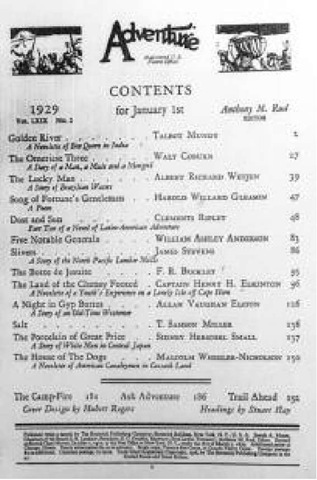(1885-1941)
With his novel Beau Geste, Percival Christopher Wren created, fully formed, a new archetypal literary category, doing for the French Foreign Legion story what H. Rider haggard did for the African adventure, Bram Stoker for the vampire, Zane grey for the western, and so on. The literature of the Foreign Legion no longer has the same stature as many other genres among popular fiction enthusiasts, but once upon a time it loomed large in the collective daydreaming of the reading public, with a widely perceived set of cliched settings, character types, and plot devices, nearly all born from the pen of P C. Wren.
A native of Devonshire, England, Wren graduated from Oxford and then, eager for adventure and exotic experiences, went into military service, becoming a cavalry trooper stationed at various colonial outposts. He later signed on for a stint in the French Foreign Legion, the association that would ultimately make his fortune. Wren went to work in India for 10 years, mainly as a teacher and colonial administrator. His first topics were teaching manuals, with such titles as The Indian Teacher’s Guide to the Theory and Practice of Mental, Moral and Physical Education (1910). His first works of fiction used the Indian background with which he was familiar, and included elements of local myth and mysticism to melodramatic effect. It was not, however, until Wren turned to another European nation’s colonial stomping ground that the writer found success.
Contents page from Adventure magazine, 1929,
Beau Geste followed the fortunes of the three Geste siblings, a close-knit trio whose boyhood games of military honor and glory and Viking funerals foreshadow the drama and adventure to come. When the honor of the brotherhood is called into question by a mysterious theft, each young man attempts to deflect the accusation against the others by fleeing the country and enlisting in the French Foreign Legion, France’s army of foreign volunteers, pledged to risk their lives in far-flung colonies to defend the empire of a country not their own. The legion’s promised anonymity made it the legendary repository of criminals, fugitives, and those who, for one reason or another, want to escape their past lives in the no-questions-asked ranks. Wren introduces the reader to life and tradition in the legion, to a colorful cast of characters (including the author’s rather broad notion of the American personality), and to the brutal discipline of a sadistic French sergeant who wields over the soldiers the power of life and death. The action moves to the vast desert of North Africa, where the characters are assigned to defend lonely Fort Zin-derneuf against attacks by rebel tribesmen. The losses mount and the survivors face slow, inevitable annihilation in the sun-scorched wasteland. A final, tragic reunion of the Geste brothers and a last “Viking funeral” brings the story to a wrenching and satisfying end.
Wren followed the hugely successful work with three sequels, the novels Beau Sabreur and Beau Ideal, and a short story collection, Good Gestes: Stories of Beau Geste, His Brothers, and Certain of Their Comrades in the French Foreign Legion. He would write of other subjects, but the legion would remain Wren’s bailiwick. Other writers followed his lead: George’s surdez and Theodore roscoe specialized in the subject, and tales of legionnaires were particularly popular in the adventure pulps (so much so that one short-lived pulp, Foreign Legion Adventures, was devoted entirely to tales of the modern mercenaries). But none would ever come close to Wren’s success and worldwide identification with the romantic, exciting subject. Helping his cause were popular adaptations of Beau Geste as silent and sound motion pictures.
In addition to Beau Geste and its sequels, Wren wrote numerous short story collections with a legion setting, and, in 1933, introduced a new legionnaire hero in the form of boisterous adventure-lover Sinclair “Sindbad” Brody. Brody was featured in three novels, Action and Passion (1933), Sindbad the Soldier (1935), and, the best of them, Fort in the Jungle (1936), an exciting tale set in French Indochina.
Wren’s portrait of the Foreign Legion was romanticized but not pretty. His fiction was filled with evocative scenes of sweating discomfort, pain and exhaustion, soldiers choking their way over sandscapes and through jungle swamps, “the Legion marking its trail with the generous distribution of the graves of its sons.” Wren’s writing was often plagued by wooden dialogue, cardboard characterization, and—to most modern readers, anyway—colonialist chauvinism, but he could also produce scenes of gripping power (the disintegration of Fort Zinderneuf) and wrote with great feeling on questions of honor, loyalty, and brotherhood, and especially on the pleasure of adventure.
Works
- Action and Passion (1933);
- Beau Geste (1924);
- Beau Ideal (1928);
- Beau Sabreaur (1926);
- Beggars’ Horses (1934);
- Bubble Reputation (1936);
- Cardboard Castle (1938);
- Cupid in Africa (1920);
- Dead Men’s Boot and Other Tales from the Foreign Legion (1949);
- Disappearance of General Jason, The (1940);
- Driftwood Spars (1916);
- Explosion (1935);
- Father Gregory, or Lures and Failures: A Tale of Hindustan (1913);
- Flawed Blades: Tales from the Foreign Legion (1933);
- Fort in the Jungle (1936);
- Good Gestes: Stories of Beau Geste, His Brothers, and Certain of Their Comrades in the French Foreign Legion (1929); Haunting of Henri (1944);
- Mammon of Righteousness, The (1930);
- Man of a Ghost, The (1937);
- Man the Devil Didn’t Want, The (1940);
- Mysterious Way (1930);
- Odd, but Even So (1941);
- Port o Missing Men (1934);
- Rough Shooting (1938);
- Sinbad the Soldier (1935);
- Snake and Sword (1914);
- Soldiers of Misfortune (1929);
- Sowing Glory: The Memoirs of Mary Ambree, English Woman Legionary (1931);
- Spanish Maine (1935);
- Stepsons of France (1971);
- Stories of the Foreign Legion (1947);
- Two Feet from Heaven (1940);
- Valiant Dust (1932);
- Wages of Virtue, The (1916);
- Worth While (1937) (also published as To the Hilt)

